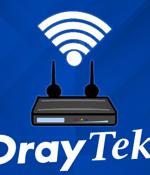Security News

Cisco says that a new authentication bypass flaw affecting multiple small business VPN routers will not be patched because the devices have reached end-of-life. "A successful exploit could allow the attacker to bypass authentication and access the IPSec VPN network," Cisco explained in a security advisory issued on Wednesday.

A variant of the Mirai botnet known as MooBot is co-opting vulnerable D-Link devices into an army of denial-of-service bots by taking advantage of multiple exploits. "If the devices are compromised, they will be fully controlled by attackers, who could utilize those devices to conduct further attacks such as distributed denial-of-service attacks," Palo Alto Networks Unit 42 said in a Tuesday report.

The Mirai malware botnet variant known as 'MooBot' has re-emerged in a new attack wave that started early last month, targeting vulnerable D-Link routers with a mix of old and new exploits. MooBot was discovered by analysts at Fortinet in December 2021, targeting a flaw in Hikvision cameras to spread quickly and enlist a large number of devices into its DDoS army.

Cisco has revealed four of its small business router ranges have critical flaws - for the second time in 2022 alone. A Wednesday advisory warns owners of the RV160, RV260, RV340, and RV345 Series Routers that the vulnerabilities could allow "An unauthenticated, remote attacker to execute arbitrary code or cause a denial of service condition on an affected device."

As many as 29 different router models from DrayTek have been identified as affected by a new critical, unauthenticated, remote code execution vulnerability that, if successfully exploited, could lead to full compromise of the device and unauthorized access to the broader network. Over 200,000 devices from the Taiwanese manufacturer are said to have the vulnerable service currently exposed on the internet and would require no user interaction to be exploited.

Researchers at Trellix have discovered a critical unauthenticated remote code execution vulnerability impacting 29 models of the DrayTek Vigor series of business routers. The vulnerability is tracked as CVE-2022-32548 and carries a maximum CVSS v3 severity score of 10.0, categorizing it as critical.

Cisco on Wednesday rolled out patches to address eight security vulnerabilities, three of which could be weaponized by an unauthenticated attacker to gain remote code execution or cause a denial-of-service condition on affected devices. The most critical of the flaws impact Cisco Small Business RV160, RV260, RV340, and RV345 Series routers.

Cisco has fixed critical security vulnerabilities affecting Small Business VPN routers and enabling unauthenticated, remote attackers to execute arbitrary code or commands and trigger denial of service conditions on vulnerable devices.Successful exploitation of CVE-2022-20842 with crafted HTTP input could allow attackers "To execute arbitrary code as the root user on the underlying operating system or cause the device to reload, resulting in a DoS condition," the company explains.

OT security: Helping under-resourced critical infrastructure organizationsIn this Help Net Security interview, Dawn Cappelli, Director of OT-CERT at the industrial cybersecurity company Dragos, talks about the OT security risks critical infrastructure organizations are facing, offers advice on how they can overcome obstacles that prevent them improving their cybersecurity posture, and explains how the recently set up OT-CERT she's heading can help asset owners and operators of industrial infrastructure. Trends to watch when creating security strategy for the next two yearsExecutive performance evaluations will be increasingly linked to ability to manage cyber risk; almost one-third of nations will regulate ransomware response within the next three years; and security platform consolidation will help organizations thrive in hostile environments, according to the top cybersecurity predictions revealed by Gartner.

Researchers from Lumen Technologies' Black Lotus Labs say they've identified at least 80 targets infected by the stealthy malware, including routers made by Cisco, Netgear, Asus, and DrayTek. Dubbed ZuoRAT, the remote access Trojan is part of a broader hacking campaign that has existed since at least the fourth quarter of 2020 and continues to operate.